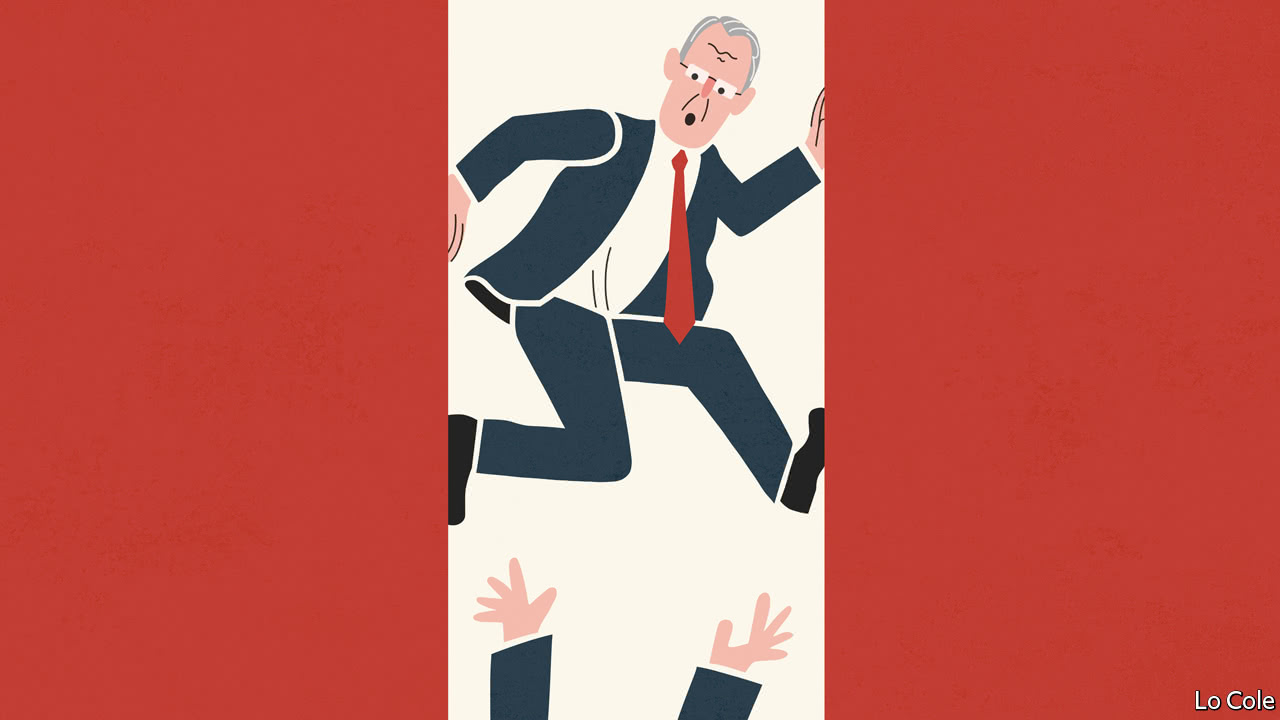Who governs Peru?
The president must face down the fujimorista congress
TO LOSE a minister to congressional censure is a normal hazard of democratic life. For a government to lose four in its first year, including the ministers of finance and the interior, on spurious grounds smacks of a parliamentary conspiracy. That is the drama that may soon face Pedro Pablo Kuczynski, Peru’s president.
A year ago Mr Kuczynski, a former investment banker, narrowly won a run-off election because slightly more Peruvians abhorred his opponent, Keiko Fujimori, than supported her. In an election for congress two months before, his political group had won just 18 of the 130 seats while Ms Fujimori’s Popular Force won 73 (partly because less populated regions are over-represented).
Latest updates
Popular Force, helped by opportunistic allies, has made its majority felt with spoiling operations. In December congress censured Jaime Saavedra, the capable education minister, who was promptly hired to run the World Bank’s global education division. Last month the transport minister resigned rather than face censure over a (justified) revision to a contract for a new airport for Cusco, the former Inca capital. On June 21st congress voted to sack Alfredo Thorne, the finance minister; it is poised to do the same to Carlos Basombrío, the interior minister.
Mr Basombrío’s sins include not arresting a few peaceful demonstrators carrying pictures of Abimael Guzmán, the jailed leader of the Shining Path terrorist group. Mr Thorne’s troubles began after he received the comptroller-general, Edgar Alarcón. The encounter was surreptitiously taped, apparently by Mr Alarcón. During it, Mr Thorne mentioned the comptroller’s budget and urged him to approve the contract for the Cusco airport. It was politically maladroit to discuss the two issues in the same meeting. But it is Mr Alarcón, not Mr Thorne, who is ethically challenged. The comptroller, who has aligned himself with the fujimoristas, is being investigated for illicitly dealing in cars and using public money to pay off a former mistress (which he denies).
The differences between the government and the fujimoristas are not ideological, according to Mr Kuczynski. “Here we have a group that resents my being the president,” he told Bello. “They have collaborated on the big stuff but they like little gestures that show their dissatisfaction with not being in the palace.” Ms Fujimori has taken defeat hard. She has barely appeared in public in the past year. She has had only one conversation with Mr Kuczynski, and that had to be arranged by Lima’s Catholic archbishop.
Mr Kuczynski inherited a slowing economy. He wanted to speed up public investment and move forward stalled mining projects. He and the country suffered a double dose of bad luck. An admission of corruption by Odebrecht, a Brazilian contractor, forced the suspension of several big infrastructure projects in Peru. Then floods killed 147 people, washed away roads and, reckons the president, reduced annual economic growth by a percentage point, to 3%. Reconstruction will take two years and cost $6.5bn, he says. The climate of suspicion in congress slows new government contracts, while political uncertainty discourages private investment. Plans to reform Peru’s corrupt and inefficient judiciary have been stymied, a case of “big stuff” being blocked by the opposition.
Mr Kuczynski faces a choice. He could seek a grand bargain, for example by pardoning Ms Fujimori’s father, Alberto, an autocratic former president jailed for abuses of power. But that would alienate the anti-fujimoristas whose votes won him the presidency. A better strategy would be to call his opponents’ bluff. Peru’s constitution allows the president to turn a ministerial censure into a matter of confidence in the government as a whole. If two successive cabinets are rejected by congress, the president can call a fresh legislative election, in which the fujimoristas would probably lose seats.
Mr Kuczynski seems to be following both tracks. He says he is looking at the possibility of pardoning Mr Fujimori: “The time to do it is about now.” But he also says that he will “definitely” make Mr Basombrío’s permanence a matter of confidence. Do that, and “they are unlikely to censure anyone”, he declared.
Some of his travails are his fault. Although he has government experience, Mr Kuczynski is not a political animal. His cabinet consists of technocrats and business people. The result is an administration that lacks a political strategy and discipline in the way it communicates. Find them, and Mr Kuczynski—and Peru—can win this battle against pique and obstruction. The alternative is to drift on, like a rudderless boat whose occupants are picked off by sniper fire.


No comments:
Post a Comment